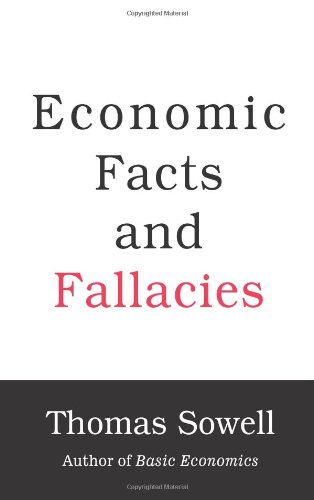A Brief Book Summary from Books At a Glance
By Benjamin Montoya
Editor’s Note: With this “Bonus” Book Summary we continue our series on culture-related issues.
About the Author
Thomas Sowell has taught economics at a number of colleges and universities, including Cornell, University of California Los Angeles, and Amherst. He has published both scholarly and popular articles and books on economics and is currently a scholar in residence at the Hoover Institution, Stanford University.
Introduction
When economic ideas are shared in the media and politics, how can we know fact from fallacy? Surprisingly, many of the things heard are fallacies. Consider this summary for an explanation of many of the fallacious ideas examined against the facts we have.
Table of Contents
Chapter 1 The Power of Fallacies
Chapter 2 Urban Facts and Fallacies
Chapter 3 Male-Female Facts and Fallacies
Chapter 4 Academic Facts and Fallacies
Chapter 5 Income Facts and Fallacies
Chapter 6 Racial Facts and Fallacies
Chapter 7 Third World Facts and Fallacies
Chapter 8 Parting Thoughts
Chapter 1: The Power of Fallacies
The real power of fallacies is that they do not look like crazy ideas. They are usually ideas that appear to be plausible and logical. But what separates a fallacy from a fact is scrutiny. Until the idea is subjected to analysis and clear definition, one cannot be certain about a given idea. “Many beliefs which collapse under scrutiny may nevertheless persist indefinitely when they are not scrutinized, and especially when skilled advocates are able to perpetuate those beliefs by forestalling scrutiny through appeals to emotions or interests. Some popular fallacies of today are centuries old and were refuted centuries ago, even if they are repackaged in up-to-date rhetoric to suit current times.”
While there are other important fallacies to consider, this book will consider the following:
- The Zero-Sum Fallacy: this fallacy believes that economic transactions are a zero-sum process, in which what is gained by someone is lost by someone else. This fallacy has resulted in some nations staying out of transactions with other nations altogether, not to the benefit of their people.
- The Fallacy of Composition: this fallacy claims that what is true of a part is true of a whole. “A baseball fan at a ballpark can see the game better by standing up but, if all the fans stand up, they will not all see better.” But this fallacy is employed widely.
- The Post Hoc Fallacy: this fallacy stems from a Latin name, Post Hoc, Ergo Propter Hoc, “After this, therefore because of this.” People have employed this fallacy widely with related events and people. But causation is something that has to be proved, not assumed. Just because things happened around the same time does not prove cause.
- The Chess-Pieces Fallacy: this fallacy stems from the idea that if someone can just arrange society in the right way, that things will go well—just like playing a game of chess. The problem is that human beings, unlike chess pieces, have their own ways of doing things, differing values, plans, etc. Society is not that simple because of humans.
- The Open-Ended Fallacy: this fallacy stems from focusing on open ended issues, like healthcare—something people will always need—coupled with open ended demands for ever-expanding governmental powers despite resources being limited.
This book will proceed by considering how these fallacies find themselves in the various issues that follow.
Chapter 2: Urban Facts and Fallacies
Cities are something that have existed for thousands of years. Why do they exist? The reasons are several. They allow for people to have to travel less time and space to get what they need and want. They provide a measure of safety, especially in walled cities in ancient times. Cities are also known for offering all kinds of entertainment options that cannot be found elsewhere.
In the modern day, there have arisen a number of urban fallacies that have resulted in political policies. One such fallacy is that mass transportation is better for the society than individual transportation via the automobile. Although this idea works sounds logical in theory, this idea does not have the support of history. Certainly, mass transit works. . .
[To continue reading this summary, please see below....]The remainder of this article is premium content. Become a member to continue reading.
Already have an account? Sign In
